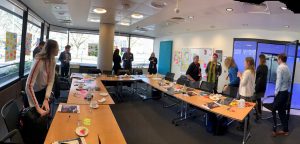Yesterday (11-3-20) I was invited by IBM to a workshop to discuss the use of technology by abusers to assert coercive control.
IBM are creating a guidance for tech designers and companies that will offer guidelines for use during the design phase of applications which will allow engineers to recognise where and how their solutions may be used to control unsuspecting victims.
Think about all your devices and how in a normal healthy relationship the fantastic features are welcomed. But then think of all the possibilities that an abuser may use these features in a sinister manner.
Alexa has a drop in feature, so as the controller of the app I could drop in and listen to what is going on, a smart TV with a camera can be remotely activated, a car can be tracked, an ipad can be mirrored, online accounts can be linked, kindles can be linked, doorbells and CCTV can be remotely viewed, heating can be adjusted. All these are great features and I have used them all but think of the power that would give me if I was an abuser.
An abuser can easily spy on their victim, see them leaving the house, track where they are going, Bluetooth to their Fitbit, look at their texts and emails even see what they are watching on Netflix and then with all this information control what they do without the victim knowing how their abuser knew.
Software, apps and devices seem to have a myriad of options that are so complicated most of us use the default features, but design engineers who set the defaults don’t actually know what you really want. If you dive into the customise options you are presented with choices that are incredibly difficult to understand let alone comprehend the consequences of altering them from the default.
The control that abusers exert isn’t new but the tools they use are. Well done to IBM for taking a lead on this.
How do I unlink my iphone from my ipad?

